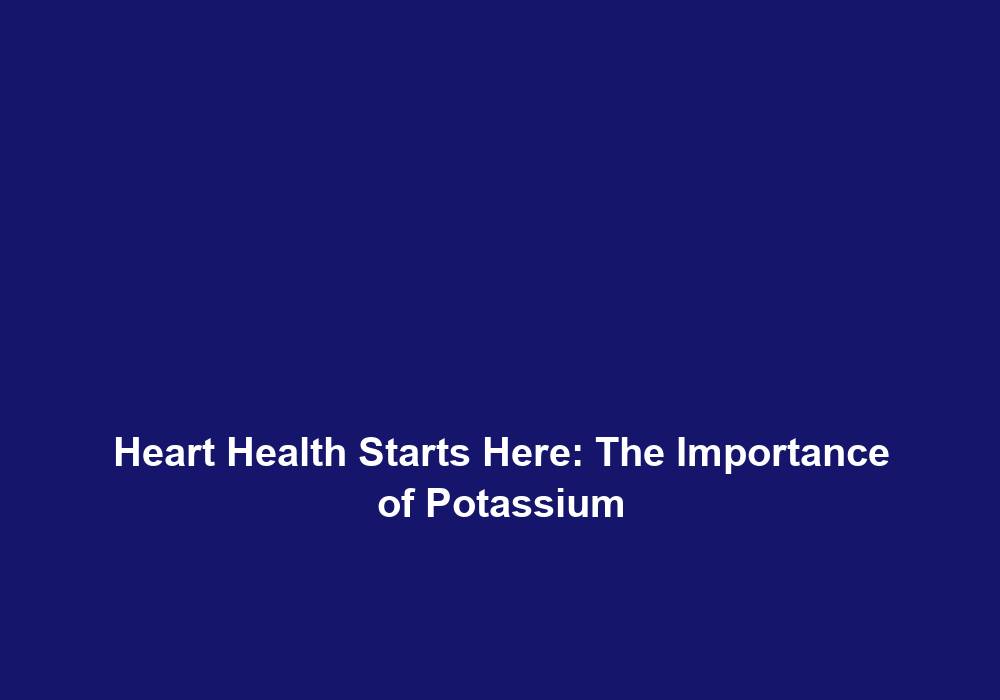Heart Health Starts Here: The Importance of Potassium
When it comes to maintaining a healthy heart, one cannot overlook the crucial role that potassium plays. Potassium is an essential mineral that our bodies require for the proper functioning of various organs and systems, including the cardiovascular system. In this article, we will explore the significance of potassium in maintaining heart health and how you can ensure an adequate intake of this vital nutrient.
The Role of Potassium in Heart Health
Potassium is an electrolyte that helps regulate the balance of fluids in our body. It plays a pivotal role in maintaining a steady heartbeat and promoting proper muscle function, including the heart muscles. The heart relies on a delicate balance of potassium and other electrolytes to maintain its regular rhythm, known as the heart’s electrical activity.
Insufficient potassium levels in the body can disrupt this balance, leading to an irregular heartbeat or arrhythmia. These irregularities can range from minor palpitations to severe conditions that may require medical intervention. Therefore, it becomes evident that potassium is crucial for maintaining a healthy heart.
Additionally, potassium has been found to aid in the relaxation of blood vessels, which helps to lower blood pressure. By ensuring a proper intake of potassium, you can contribute to the overall health of your cardiovascular system and reduce the risk of heart-related issues.
Blood Pressure Regulation
Another significant benefit of potassium is its ability to regulate blood pressure levels. High blood pressure, also known as hypertension, is a prevalent risk factor for heart disease and other cardiovascular issues. Potassium helps counterbalance the effects of sodium, which is known to raise blood pressure.
When we consume too much sodium and not enough potassium, our body’s delicate balance is disturbed, resulting in higher blood pressure. By increasing potassium intake, we can help negate the adverse effects of sodium and maintain healthy blood pressure levels. This, in turn, reduces the risk of heart disease and related complications.
Furthermore, potassium acts as a vasodilator, meaning it helps to widen blood vessels, allowing for improved blood flow. This not only helps to reduce blood pressure but also ensures that vital organs, including the heart, receive the necessary oxygen and nutrients they need to function optimally.
Potassium and Stroke Prevention
Stroke, often caused by blood clots or ruptured blood vessels in the brain, is a severe condition that can result in long-term disability or even death. Studies have shown that a diet rich in potassium can significantly lower the risk of stroke.
Potassium’s role in stroke prevention is attributed to its ability to regulate blood pressure and maintain the integrity of blood vessels. By promoting healthy blood flow and preventing the formation of blood clots, potassium acts as a natural defense against stroke.
Moreover, potassium has been found to have antioxidant properties, which can help protect against oxidative stress and inflammation. These factors are known to contribute to the development of stroke and other cardiovascular diseases. By including potassium-rich foods in your diet, you can enhance your body’s natural defense mechanisms and reduce the risk of stroke.
Dietary Sources of Potassium
Now that we understand the importance of potassium in maintaining heart health, let’s explore some dietary sources that can help us meet our daily potassium requirements:
-
Fruits: Bananas, oranges, kiwis, and avocados are excellent sources of potassium. They not only provide this essential mineral but also offer other nutrients that contribute to overall heart health. Incorporating these fruits into your daily diet can help ensure an adequate intake of potassium.
-
Vegetables: Dark leafy greens like spinach and kale, as well as tomatoes, potatoes, and sweet potatoes, are rich sources of potassium. These vegetables are not only nutritious but also delicious additions to any meal. Adding them to your diet can help boost your potassium intake and support heart health.
-
Beans and Legumes: Foods like lentils, kidney beans, chickpeas, and soybeans are not only rich in plant-based protein but also provide a substantial amount of potassium. Including these nutrient-dense foods in your diet can help you meet your potassium needs while also benefiting from their high fiber content.
-
Dairy Products: Yogurt, milk, and cheese are not only good sources of calcium but also contain potassium. Opt for low-fat or non-fat dairy options to keep your saturated fat intake in check. These dairy products can be incorporated into various meals and snacks to increase your potassium intake.
-
Fish: Certain types of fish, such as salmon and tuna, are not only rich in heart-healthy omega-3 fatty acids but also provide potassium. Including fish in your diet twice a week can be beneficial for your heart health. Be sure to choose wild-caught fish whenever possible to minimize exposure to pollutants.
-
Nuts and Seeds: Almonds, pistachios, pumpkin seeds, and flaxseeds are examples of potassium-rich nuts and seeds that can be incorporated into your diet as healthy snacks. These nutrient-dense snacks not only provide potassium but also offer a good source of healthy fats and antioxidants.
It is important to note that individuals with certain medical conditions or those taking specific medications may need to consult with their healthcare provider regarding their potassium intake, as excessive levels can also be harmful. A healthcare professional can assess your specific needs and recommend an appropriate potassium intake for you.
Conclusion
In conclusion, potassium plays a vital role in maintaining heart health. From regulating the heart’s electrical activity to managing blood pressure and preventing strokes, potassium offers numerous benefits for our cardiovascular system. By incorporating potassium-rich foods into our diet, such as fruits, vegetables, beans, legumes, dairy products, fish, nuts, and seeds, we can ensure an adequate intake of this essential mineral and promote a healthy heart. Remember to consult with a healthcare professional to determine the appropriate potassium intake for your individual needs. Stay proactive about your heart health by prioritizing potassium-rich foods and maintaining a balanced diet.







